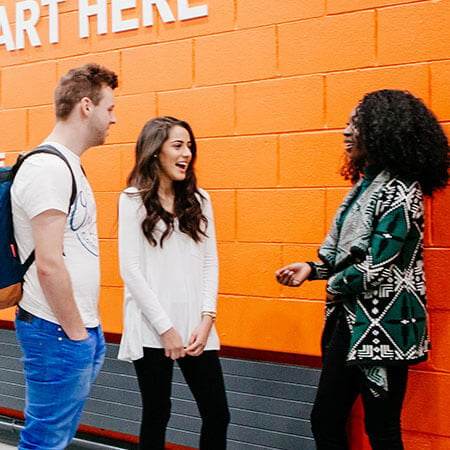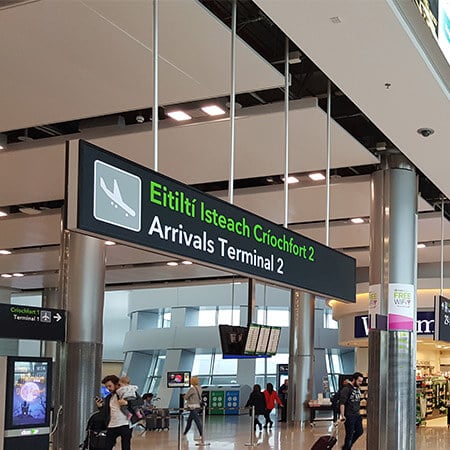Do I need a student visa to study in Ireland?
So you’re coming to study in Dublin? If you are a citizen of any country within the EEA or the EU’s single market, you won’t need a student visa.
These countries include Austria, Belgium, Bulgaria, Croatia, Cyprus, Czechia, Denmark, Estonia, Finland, France, Germany, Greece, Hungary, Iceland, Italy, Latvia, Liechtenstein, Lithuania, Luxembourg, Malta, Netherlands, Norway, Poland, Portugal, Romania, Slovakia, Slovenia, Spain and Sweden.
UK citizens and Swiss nationals don’t require one either. Neither do citizens of any country which doesn’t require entry visas for Ireland – this covers around 50 countries from all over the world, including the US, Canada, Japan, New Zealand, Australia and the UAE. You’ll find the full list on CitizensInformation.ie.
However, you do need a student visa if your passport or travel documents have been issued by any of the countries listed here.
Am I eligible for a student visa?
You are eligible for a student visa if you are enrolled in a full-time course that features on the Interim List of Eligible Programmes. Your college will also be able to tell you whether the course is eligible.
How do I get a student visa?
You must apply online. Your application won’t be processed until the online form is completed and all the required documentation, passport photos and appropriate fees are submitted.
What will I need to do when I apply for a student visa?
- Complete an online application
- Check which Irish Embassy your documentation needs to be sent to
- Provide a passport photo
- Pay the application fee
- Provide a signed letter of application which explains why you require a student visa
- Provide evidence from your college that you have been accepted on a full-time course
- Show evidence that you have paid your tuition fees. (Where course fees are less than €6,000, they must be paid in full. If your fees are higher than this, you must pay at least this amount prior to submitting your application.)
- Ensure your passport is valid for 12 months
- Have private health insurance
- Show that you have enough money to support yourself while in Ireland through bank account statements for the past six months, evidence of access to €7,000 and a sponsorship letter
- Show evidence of English language proficiency – a grade five in the International English Language Testing System is required
- Provide any other documents as requested by the Irish Naturalisation and Immigration Service (INIS) or the Irish Embassy through which you are applying
- Make sure you keep copies of all documents submitted
A full guide to the application process is available on the INIS website.
What will my visa cost?
Fees vary from €25 up to €100. You can check the immigration service’s website for the most up-to-date figures.

What happens when I arrive in Ireland?
If you’re from an EU or EEA country, once you arrive in Dublin, you can go about setting up your new life. However, those from outside the EEA will need to make sure they register with INIS.
For those who need to register, an immigration officer at Dublin airport will review your passport and paperwork. Make sure you bring all your college documents with you, including your offer letter, evidence of private health insurance, accommodation details and evidence of tuition fee payment – or, alternatively, details of your scholarship or US Financial Aid.
After this, temporary immigration permission will be stamped into your passport. This will last either one or three months. Be sure to check which, because you must register with the INIS within that timeframe.
In order to obtain permission to stay in Ireland, students from outside the EEA need to register with INIS after registering with their college. However, INIS registration must also take place before the expiry date stamped on your passport so be sure to contact your college quickly.
It’s worth noting that although students coming from non-EEA countries like the US, Canada, Australia and South Korea do not require a student visa for Ireland, they will need to register with INIS after their arrival in Dublin.

How do I complete immigration registration with INIS?
If you live in Dublin, you must make an appointment to meet with INIS at the Burgh Quay Registration Office in the city centre. You can book an appointment and find a list of the documents you need to bring with you here.
Can I work in Ireland while I’m on a student visa?
Yes, you can take up casual employment of up to 20 hours part-time work per week during term time. Then, you can increase your work hours to 40 per week during college vacation periods – from June to September inclusive and from 15 December to 15 January.
What if I want to work in Ireland after graduation?
EU nationals are entitled to work in Ireland at any time. They don’t need an employment permit. Neither do citizens of the UK, Switzerland or EEA countries like Norway, Iceland and Liechtenstein.
After graduation, students from other countries can take advantage of the Third Level Graduate programme which allows non-EEA graduates with an Irish qualification to work in Ireland after their studies. Find out more about the eligibility requirements, as well as the job opportunities for international students in Dublin.




